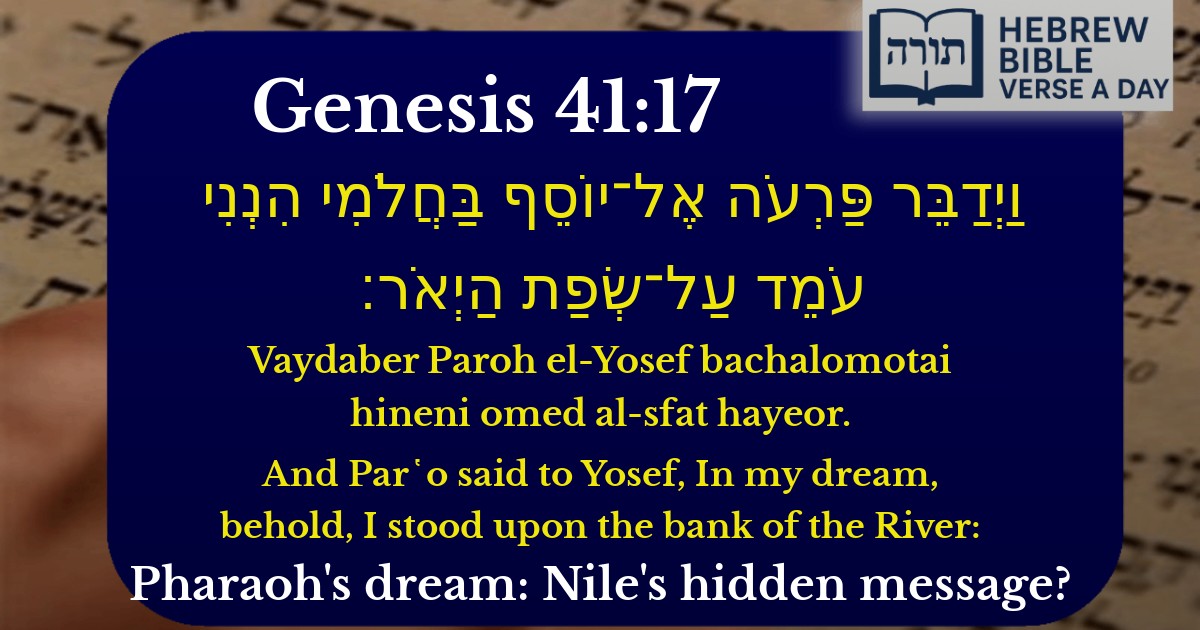Frequently Asked Questions
Q: What is the significance of Pharaoh standing on the bank of the river in his dream?
A: According to Rashi, Pharaoh standing on the riverbank symbolizes his connection to the Nile, which was the lifeblood of Egypt. The dream hinted at future events—years of plenty and famine—that would affect Egypt's sustenance, as the Nile represented their primary source of water and agriculture.
Q: Why did Pharaoh tell his dream to Yosef (Joseph)?
A: Pharaoh told his dream to Yosef because Yosef had already proven his divine wisdom by correctly interpreting the dreams of Pharaoh's butler and baker (Genesis 40). The Midrash explains that Pharaoh recognized Yosef's ruach hakodesh (divine inspiration) and sought his insight for the troubling dream.
Q: What lesson can we learn from Pharaoh sharing his dream with Yosef?
A: The Talmud (Berachos 55b) teaches that dreams require interpretation to be fulfilled. Pharaoh's willingness to seek Yosef's wisdom shows the importance of consulting Torah scholars for guidance. This teaches us humility—even a powerful king recognized the need for divine wisdom from a righteous interpreter.
Q: How does this verse connect to the broader story of Yosef in Egypt?
A: This moment marks the turning point where Yosef transitions from prisoner to leader. The Ramban explains that Pharaoh’s dream and Yosef’s interpretation set in motion Yosef’s rise to power, fulfilling the earlier dreams of his brothers bowing to him (Genesis 37), showing Hashem’s plan unfolding through seemingly ordinary events.
Q: Why does the Torah emphasize that Pharaoh 'stood' by the river?
A: The Midrash (Bereishis Rabbah 89:4) notes that 'standing' suggests readiness for judgment or action. Here, it foreshadows that Pharaoh—and by extension, Egypt—would soon face a test of sustenance (the years of plenty and famine), requiring decisive leadership, which Yosef would ultimately provide.


Pharaoh's Dream and Its Significance
The verse states: "וַיְדַבֵּר פַּרְעֹה אֶל־יוֹסֵף בַּחֲלֹמִי הִנְנִי עֹמֵד עַל־שְׂפַת הַיְאֹר" ("And Pharaoh said to Yosef, 'In my dream, behold, I stood upon the bank of the river'"). This marks the beginning of Pharaoh's recounting of his prophetic dream, which Yosef later interprets as a divine warning about impending famine.
Rashi's Commentary on the Verse
Rashi (Genesis 41:1) notes that Pharaoh's standing "עַל־שְׂפַת הַיְאֹר" ("upon the bank of the river") is significant because the Nile River was the lifeblood of Egypt, symbolizing sustenance and prosperity. The fact that Pharaoh dreams of standing there suggests his connection to the nation's well-being, as the dream ultimately concerns Egypt's agricultural future.
Symbolism of the River in Jewish Thought
In Midrashic interpretation (Bereshit Rabbah 89:3), rivers often represent divine providence and judgment. The Nile, in particular, was worshipped by the Egyptians, yet in this dream, it becomes a medium for Hashem's message—demonstrating that even Pharaoh, a pagan ruler, could receive prophecy when necessary for Jewish history (Rambam, Hilchos Yesodei HaTorah 7:1).
Yosef’s Role as Interpreter
The Talmud (Berachos 55b) teaches that dreams follow their interpretation, meaning the way a dream is explained shapes its outcome. Yosef, as a tzaddik (righteous man) and prophet, was uniquely qualified to decode Pharaoh's dream accurately, ensuring Egypt's survival and setting the stage for Bnei Yisrael's eventual descent into Egypt (Sforno on Genesis 41:15).
Key Lessons from the Verse